Welcome to the July 2012 issue of the Global Washington newsletter. If you would like to contact us directly, please email us.
IN THIS ISSUE
- Note from our Executive Director
- Featured Organization: A Child’s Right: Providing kids with clean water and proving it daily
- Changemaker: Dr. Michael J. Free: Where Bliss Meets Global Needs
- Feature: Global Washington members explore opportunities for collaborative development work in Vietnam
- Welcome New Members
- Career Center
- Announcements
- Global Washington Events
- Other Events
Note from our Executive Director
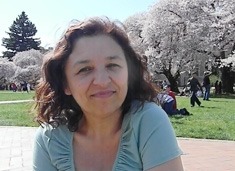 Greetings, July is Global Health Month in Seattle and I hope you have had a chance to visit the Global Health Experience Exhibit at the Seattle Center. Many Global Washington members have taken part in creating and promoting the exhibit and the other exciting events this month that celebrate and inform you about the contributions of this sector. This month’s newsletter profiles focus on an organization and an individual who are making important health-related contributions around the world. The first, A Child’s Right, is a relatively new organization keeping children healthy in urban areas in Asia by taking a new and innovative approach to clean water systems. The second profile features Dr. Michael Free, who has worked at PATH since its formation and been instrumental in the development of over 80 global health technologies.
Greetings, July is Global Health Month in Seattle and I hope you have had a chance to visit the Global Health Experience Exhibit at the Seattle Center. Many Global Washington members have taken part in creating and promoting the exhibit and the other exciting events this month that celebrate and inform you about the contributions of this sector. This month’s newsletter profiles focus on an organization and an individual who are making important health-related contributions around the world. The first, A Child’s Right, is a relatively new organization keeping children healthy in urban areas in Asia by taking a new and innovative approach to clean water systems. The second profile features Dr. Michael Free, who has worked at PATH since its formation and been instrumental in the development of over 80 global health technologies.
As many of you are vacationing or enjoying the summer weather, we’re still glad that some of you haven’t been too busy for our summer events! This month we had a wonderful discussion with Oxfam America about their Equitable Food Initiative and how this domestic program is linked to their international work. We also recently welcomed Poonam Ahluwalia, founder of YES, who talked about her new venture, YouthTrade, which empowers young entrepreneurs to access the markets that will help them succeed. We also recently hosted a delegation of officials from the Vietnam Union of Friendship Organizations and the People’s Aid Coordinating Committee, who are looking to form partnerships with organizations based in Washington State to do development work in Vietnam. Many of our members met with these officials at the Microsoft Conference center to learn about Vietnam and explore opportunities for collaboration. If your organization works in Vietnam and you want to be a part of this ongoing work, please let us know!
At Global Washington, we are enjoying summer, but we are also eagerly planning our fall programming. We are especially excited for Global Action Day 2012, which we will lead up to with an awareness campaign focusing on education, economic opportunity, and education for women and girls. We will celebrate with a community event called “GlobalFest” at the Seattle Center on September 22nd. We will be there along with many of our members and we hope to see you there as well! Finally, I am excited to announce that one of the speakers for our 2012 Annual Conference will be Dr. Sakena Yacoobi, founder and Executive Director of the Afghan Institute of Learning. This premier leader and award-winner has provided education and health services to more than 9 million Afghan women and children and we are looking forward to hearing her thoughts on December 6th. You can register for the conference on our website. Remember—early bird prices end in August! In unity,
![]()
Bookda Gheisar, Executive Director
Featured Organization
Member Profile: A Child’s Right: Providing kids with clean water and proving it daily
By Megan Boucher

A Child’s Right
“Kids. Urban. Water. That’s what we do,” Eric Stowe, Founder and Director of A Child’s Right, told me as we sat in the organization’s hip new office on Capital Hill in Seattle. One word that aptly describes Stowe and his team is “focused”: on the long-term results they want to see, on transparency with their donors, and on what they do best. Kids-Urban-Water is a simple three-word formula that is already creating a big impact. According to the organization’s website, over 200,000 children currently have reliable, safe drinking water thanks to A Child’s Right, and the plan is for that number to increase.
The idea for A Child’s Right came from the innovative combination of two unlikely concepts: orphanages and fast food. Stowe spent many years in the field of international adoption, mostly in China. He walked families through the adoption process, including traveling with them to the orphanages. They would go out for comfort food like Burger King or Starbucks, and he noted that these restaurants had consistent access to potable water, while orphanages in the same communities did not. He eventually started working directly with orphanages trying to help them function better. “What are your most critical needs?” he asked them, aiming for solutions that would have both immediate and long-term impact. The two most consistent responses were “clean water” and “better training for caregivers.” “I didn’t have a clue how to take on the latter!” Stowe recalled. “But the first sounded doable. If McDonald’s is using the technology, then it must be available.”
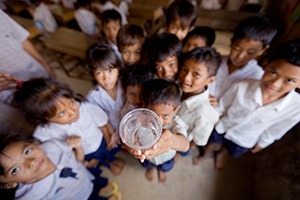
A Child’s Right
He started shamelessly “pilfering” filtration ideas from fast food chains. Restaurants rely on consistent, efficient, high-volume filtration technology that Stowe began implementing in Chinese orphanages in 2003 with positive results. Stowe founded A Child’s Right in 2006, and the organization has expanded to Cambodia, Ethiopia, Vietnam, Thailand, and Nepal. One early success in Kathmandu confirmed for Stowe the effectiveness and scalability of the system. “My first water system in Nepal was put in an orphanage in Kathmandu. The caregivers at the site mentioned that a year later they went from 12-13 bouts of dysentery in a year down to one. A dozen down to one was pretty awesome!” He eventually started using the same technology in other institutions where children need clean water: schools, hospitals, feeding centers, street shelters, and rescue homes for trafficked women and children.
To date, A Child’s Right has operated under what Stowe calls a “traditional charity model,” with an eye toward long-term sustainability. For the first ten years of involvement A Child’s Right funds the majority of the project, which includes installation, oversight, training, water quality testing, maintenance, and spare parts. “What happens beyond ten years is the true sustainability question,” said Stowe. “Our guiding vision is to fully transfer ownership to local sites during the eleventh year of operation.” They are looking at some innovative ways to get there that make the most sense for the countries where they work.
One of the non-traditional models they’re testing involves creating local markets for filtration systems, which can continue long after A Child’s Right strategically exits the community. In Kathmandu, for example, the organization is currently building the market capacity through systems and staff with technical skills. “We’re leaving in our wake a vibrant social enterprise that is focused on filtration for the base-of-pyramid. But they are doing it for-profit,” Stowe explained. The idea is that this budding enterprise—not the nonprofit organization A Child’s Right—will ultimately bring filtration to schools and orphanages in other parts of Nepal.
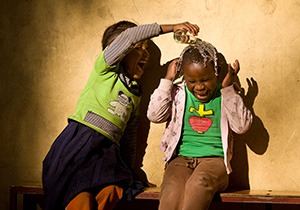
A Child’s Right
In yet another sustainability model, A Child’s Right is reaching out to local for-profit filtration companies, offering to help them add water projects for children to their Corporate Social Responsibility (CSR) programs. Many countries already have robust markets for filtration, but they are currently only servicing places like fast food chains and hotels. A Child’s Right hopes that, with a little coaching, these companies will start serving base-of-the-pyramid populations in their own communities. “It is a win-win,” Stowe insisted. “It’s their own kids. Their workers can be involved in something far more meaningful than just putting in filtration in a McDonald’s or a Hyatt. They can use existing revenue streams that they are currently allocating to CSR anyway.”
In addition to providing kids in urban settings with clean water, another essential focus for the organization is transparency. “We are insanely open and honest with our deficiencies and failures,” said Stowe. A Child’s Right uses a database called Proving It to track and quickly publish data about the successes and failures of its projects. They operate on three key principles: “be honest with the numbers,” “everything goes live,” and “donors know when we know.” These principles reflect the organization’s commitment to providing current and accurate information—whether good or bad.
Publishing failures seems risky, but so far the response has been overwhelmingly positive. When I mentioned that many organizations want to be similarly transparent but don’t have the capacity to do so, Stowe laughed and said, “Wedon’t have the capacity. We have had to divert staff time and attention to it. But we do it because it is such a core ethical driver.” A Child’s Right believes so strongly in this concept that they hope to be a model for others. They are working to enhance Proving It and plan to eventually make it available as open source software to other organizations.
They are clearly doing something right. The organization has drastically expanded in the last two years, going from a domestic staff of one (just Stowe) to a staff of twelve. They have also secured the funding to take their operations to ten more countries by 2020. Amidst expansion and success, the organization is clear and deliberate about their strategic goals. “Sixteen countries is our stop,” said Stowe emphatically. “We’re focused on Asia because that is where there is the greatest need and where we can make the biggest impact.”
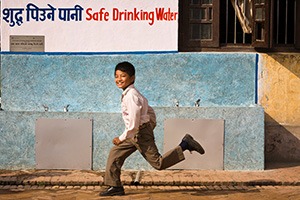
A Child’s Right
Going along with this, A Child’s Right is committed to local ownership and a deliberate exit strategy. In some countries, they need only be active for a few years to build out local filtration markets, which can then function on their own. In others, A Child’s Right may need to be present for many years. However, in every country, Stowe and his staff hope to eventually work themselves out of their jobs. This goal is a deliberate part of their strategic plan. “We very sincerely mean it,” said Stowe. “I really like this job and we all love working here. But we don’t need to be needed in 30 years.” In time, these countries will have the capability of doing this work for themselves without the help of an outside NGO.
The growing organization recently moved its offices from Tacoma to Seattle, and the team is thrilled to be a part of Seattle’s vibrant community. They welcome visitors to their new office and collaborators who will help them do what they do even better. “We have aggressive growth plans and all of them require us to learn from others who are doing really solid work,” said Stowe. In turn, those who want to learn more about transparency and practical solutions with significant impact can explore the exemplary work of A Child’s Right in providing clean water to thousands of children. And you don’t have to take my word for it because the organization is currently “proving it” publically on their website—one child at a time.
Changemaker
Dr. Michael J. Free: Where bliss meets global needs
By Megan Boucher
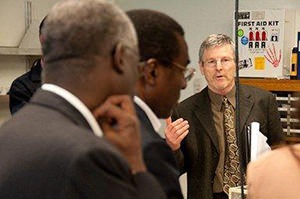
Dr. Michael Free leading an international delegation
on a visit to PATH’s Seattle HQ
PATH/Patrick McKern
Flu-like symptoms are not usually cause for alarm—unless you live in or have recently travelled to a malaria-prone area. “Because you’ve been in Africa, we’ll need to test you,” my doctor told me recently, when I complained of an unexplained fever. “It will take a vial of blood and 48 hours to find out if you have malaria.” I didn’t, but I couldn’t help recalling another malaria test administered in a children’s home in Mozambique for a visitor who was feeling ill. His whole team huddled around a wooden dining table, curiously awaiting the results of a finger prick strip test administered by one of the resident nurses. It took less than 15 minutes to yield a negative result. I, on the other hand, spent two days in Seattle waiting for test results and half-wishing to be back in Mozambique where they came more quickly.
I was a firsthand witness to Seattle’s global health sector in action. “Yes, PATH actually developed the first of those,” confirmed Dr. Michael J. Free when I told him about the rapid strip test. Malaria can be dangerous if left untreated; the traditional tests are more accurate but take time, expense, and a high level of expertise. In contrast, rapid strip tests are simple and inexpensive—perfect for healthcare workers, clinics, and low-resource hospitals in malaria-prone areas. Dr. Free is Vice President and Senior Advisor for Technologies and Global Program Leader for Technology Solutions at PATH and he and his team work to develop health solutions like the strip test to improve the lives of people in the developing world.
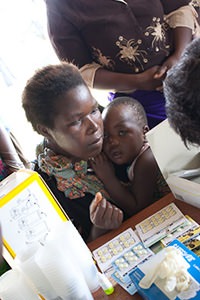
Malaria testing
PATH/ Gena Morgan
July 2012 is Global Health Month in Seattle. It would be impossible to celebrate the accomplishments of this sector without recognizing the work of pioneers like Dr. Free, who started contributing to the global health sector before most of us recognized its existence. “He is a bit of a legend around here,” laughed the PATH staff member who greeted me when I arrived to interview Dr. Free. “He has been around since the beginning of the organization.” In fact, Dr. Free’s deep involvement in Washington State’s global health sector includes seven years at Battelle Northwest; involvement in the formation and board of directors of VillageReach, a Seattle-based community health nonprofit; and of course, an extensive and prolific career at PATH. After 35 years at PATH, Dr. Free will be retiring from official duties but intends to continue consulting and advising on global health technologies.
Dr. Free is a British citizen who received his undergraduate degree in physiology from the University of Nottingham, England. “It looked like there were more possibilities for my particular brand of individualism in the United States,” he recalled of his decision to come to the U.S. in 1965. He finished his master’s degree and doctorate in physiology at Ohio State University and then headed further west to the Bay Area of California. That part of the country epitomized the free-spirited culture of 1960s, of which Dr. Free spoke nostalgically. “The chaos, the summer of love, the disruption of classes, and the war protests were a great introduction to the cauldron that is America,” he recalled.
His work through that time was mostly research in reproductive health and physiology, but he had always had an interest in health solutions for the developing world. He grew up in a little village in the country in England and left home at age 15. He cannot pinpoint exactly when his interest in global development began, but during his younger years, he worked at various jobs and met immigrants who told him their stories. “They talked about their home countries and what conditions were like there; what their families had to endure. I think it left a mark on me,” he said.
Early on in his career, there were fewer opportunities to work directly with solutions for the developing world, but the interest was still there. “One of my basic philosophies,” he explained, “is that when faced with different paths in the road, I always try to pick the branch that retains the most opportunities and look at how they fit into what my bliss might be. I’m a great believer in bliss.”
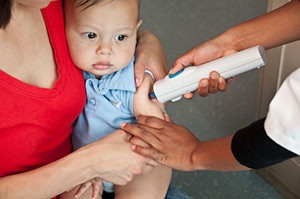
A disposable syringe jet injector
PATH/Patrick McKern
Dr. Free was able to do more work connected to his bliss when he was recruited to Battelle Northwest by Gordon Duncan. Dr. Free called himself a “tinkerer” who feels at home developing technology. His years at Battelle were spent mostly on technologies related reproductive health such as IUDs, sterilization, and other forms of contraception. In the mid-1970s, Gordon Duncan and two other researchers began discussing a new type of health organization that would forge partnerships between the public sector and the for-profit sector to increase access to contraception in the developing world. “It was very exciting and futuristic,” recalled Dr. Free. Government entities and organizations were developing contraceptive technology, but no one was looking to the private sector to effectively bring these technologies to the developing world. “The whole idea of public/private partnerships was born in these discussions,” Dr. Free said.
The proposed organization was formed in 1977 under the umbrella of Battelle and Dr. Free was one of its earliest employees, initially staying on at Battelle and working with the new organization as a consultant. The venture eventually became independent and is now known as PATH, which stands for Program for Appropriate Technology in Health. “I eventually left Battelle because it looked like my destiny was with this new organization,” Dr. Free said of his decision 31 years ago to work at PATH fulltime.
PATH’s early work involved transferring manufacturing technology for contraceptives to China and Vietnam, creating modern factories in populous countries to increase access. Early on, PATH widened its scope from reproductive health to health in general. In the 1970s and 1980s, with support from USAID, PATH began creating a design engineering facility and a biotechnology laboratory and started using them to tackle numerous health problems faced around the world.

Fast dissolving tablet technology
PATH/Patrick McKern
In addition to advances in reproductive health, Dr. Free’s team at PATH boasts other innovative solutions over the years. They have increased the quality and safety of immunizations, for example, by creating a syringe that cannot be used twice to prevent the reuse of needles. They have worked on advances in maternal and neonatal care like technology to help newborns breathe at birth or to protect mothers from blood loss. They have also improved diagnostics at the point-of-care, like the rapid strip malaria test. Other work includes household water purification technology and better health and information systems.
Coming up with effective new technology requires creative people who have an intimate understanding of the problems that need to be solved. Each solution team at PATH is balanced with technology specialists, business professionals, and public health experts who work together to develop holistic solutions. Another key concept is to bring in the user as a co-designer. “The idea that there isn’t innovation in these countries is just the wrong idea,” explained Dr. Free. “They just don’t yet have the means to express those innovations and to manifest them into tools. Tapping their experience is not only critical; it is crazy if you don’t!”
Dr. Free has thus spent a great deal of time throughout his career in the field, observing problems and solutions firsthand and talking to users about the technologies. When he sees the solutions that he developed in use, he often finds the experience more intriguing than gratifying. “You’re usually thinking more about whether there are furtherimprovements that can be made,” he laughed. He also mentioned the need to go back and observe the consequences of a new technology. For example, the one-time-use syringes solved one problem, but led to seven times as many dirty needles in the trash. “But we did develop a solution,” he said. “A simple needle destroyer.”
Under Dr. Free’s leadership, PATH has advanced more than 80 technologies to improve health in the developing world. However, choosing any one that he is particularly proud of is to him like “asking someone to choose a favorite child.” In fact, excitement about and investment in every technology is an important component to success, as they can take years of work before implementation. “You have to be incredibly patient and tenacious,” he said. “You may go through long periods of drought.”
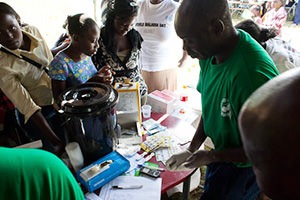
Malaria testing
PATH/Gena Morgan
Dr. Free attributes much of his success to the strength of his team, who “have the right stuff” to weather the droughts and push forward to success. “My secret sauce is being able to hire people that are smarter than me,” he insisted. His direct team currently includes 105 people, many of whom are long-time, loyal PATH employees. He works to cultivate a culture of mutual support and collaboration–something that reflects the community spirit of PATH as a whole. “It’s remarkable that PATH has been able to keep that original fire through many, many stages of growth, even now with almost 1,200 employees scattered around 40 countries,” he reflected. “It’s one of the great achievements of PATH.”
Current projects for Dr. Free’s team include new delivery methods for vaccines (rapid dissolving tablets under the tongue), new diagnostics for point-of-care including DNA tests, and the simple application of a well-known antiseptic to umbilical cords to decrease early infant mortality. Such solutions—from simple to complex—will improve the quality of life for people all over the world. Dr. Free was recently named an Officer of the Order of the British Empire (OBE) by Queen Elizabeth for his work in health technologies, a high honor reserved for those who have demonstrated exemplary service and innovation. As our community celebrates global health achievements during the month of July, we are pleased to recognize the innovative contributions of Dr. Free and PATH and hope the work continues to make our world a safer and healthier place.
Feature
Global Washington members explore opportunities for collaborative development work in Vietnam
By Sean O’Keefe
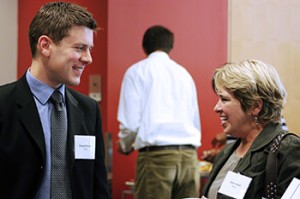
Global Washington
On June 27, Global Washington was honored to welcome five distinguished leaders of Vietnam’s efforts to promote sustainable, equitable development for the Vietnamese people. The delegates represented the Vietnam Union of Friendship Organizations (VUFO) and its People’s Aid Coordinating Committee (PACCOM), an interdepartmental body that reports directly to the prime minister of Vietnam. PACCOM surveys all development efforts within Vietnam, facilitates and coordinates these activities, and promotes lasting partnerships between international NGOs and Vietnamese institutions and community associations.
Delegates included:
- Mr. Don Tuan Phong, Vice President of Vietnam Union of Friendship Organizations and Director General of the People’s Aid Coordinating Committee;
- Mr. Le Van Hoang, Deputy Director General, Ministry of Public Security;
- Ms. Tran Thi Khanh Van, Program Coordinator, the People’s Aid Coordinating Committee (North American desk)
- Mr. Tran Quang Trung, Department of International Organizations, Ministry of Foreign Affairs;
- Mr. Bui Hong Nhat, the Central Commission of External Relations under the Central Committee of Vietnam;
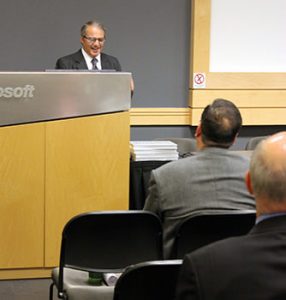
Lieutenant Governor Brad Owen addresses
the crowd at Microsoft
Photo Credit: Global Washington
Microsoft graciously invited the Vietnamese delegation and about 60 friends of Global Washington to a reception at its Redmond campus. Akhtar Badshah, the Senior Director of Global Community Affairs at Microsoft, started the conversation with a presentation about the development, capacity building, and youth empowerment programsthat Microsoft does in communities across the world. Lieutenant Governor Brad Owen spoke about what Washington’s organizations can offer the world of global development. Bill Clapp, the founder of Global Washington, then gave a short history of the organization and the idea behind its Vietnam Working Group.
The Vietnam Working Group brings together Washington State nonprofits, businesses, and academic institutions that are engaged in education, global health, environmental sustainability, and poverty alleviation work in Vietnam. Global Washington is surveying and mapping this engagement to help discover exactly where efforts and programs are needed most. The vision is for a forum where members strengthen each others’ efforts by sharing their ideas, contacts, best practices, institutional memory, and on-the-ground experiences. The roll out of the Vietnam Working Group map, which uses Microsoft’s Local Impact Map software, will happen soon.
Mr. Phong painted a vivid picture of the challenges that Vietnam faced when it began the Doi Moi reforms. In 1990, Vietnam had seen only six years of peace in the previous century. The country faced a food deficit, a 60% poverty rate, a per capita GDP of $200, near total diplomatic isolation, and almost no access to outside markets. Today, the poverty rate is now between 12% and 18% and the per capita GDP is $1,168. Now, Vietnam is a major rice exporter, a lower middle-income country, and a politically and economically integrated member of the international community.
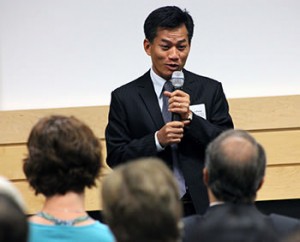
Mr. Don Tuan Phong addresses GlobalWA
members and supporters
Photo credit: Global Washington
Yet much remains to be done. Social gaps between rich and poor and between ethnic groups are widening. Vietnam must help the disabled, ethnic minorities, people with AIDS, Agent Orange victims, and other at-risk groups catch up with the nation’s pace of development. Vietnam faces the risks of pandemics, climate change, and an overheating economy that faces global competition. Almost 70% of the population is rural. 80% of labor force has no formal job training at all. “We have to compete with giants from overseas,” which is especially difficult for small-scale Vietnamese producers, said Mr. Phong.
He noted that, “international help has contributed significantly to our successes so far. With international cooperation, we will be able to move faster and reach our development targets.” Vietnam has even begun leveraging its resources and expertise in development projects in Africa and Southeast Asia. To do it on a large scale, Mr. Phong said, “we need to be mighty first. That’s why cooperation with the nonprofit sector, the international communities, and the business sector will always play a huge role in Vietnam.”
The Vietnamese government has relationships with over 900 international non-governmental organizations. All told, INGOs have given Vietnam 3 billion USD in assistance. This funding has contributed greatly to poverty reduction, sustainable development, and expanding international understanding among many different peoples.
Mr. Phong identified three development priority areas that Washington organizations can and should target:
- Education and health care: “our people are the means to AND end of development at the same time. So we invest in people.”
- Environment: environmental protection, conservation of wildlife and habitats, climate change. No development could be sustained without this, but climate change natural disasters are a much bigger risk for Vietnam than for most countries.
- Addressing the consequences of war: this includes de-mining, bomb disposal, Agent Orange victims, and people with disabilities. Vietnam has a national strategy on mine action, but it would last 100-200 years without international assistance. We need to be able to clear mines and make the land safe.
At a smaller working lunch for the Vietnamese delegation and the Vietnam Working Group’s members, Mr. Phong explained the relationship between international NGOs system and Vietnamese institutions in more depth:
“The interdepartmental committee for INGO affairs reports directly to the prime minister. The committee includes nine government departments and it oversees all development work and facilitates the work of all INGOs at the central level. At the local level, the provincial officials can make decisions themselves over cooperation with INGOs. Lots of decisions are made at local levels. We have a strong tradition of decentralization in this area.”
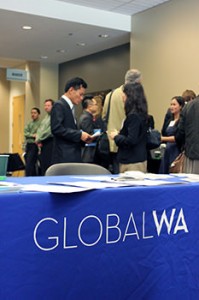
Global Washington
PACCOM is constantly adding to its comprehensive database of the information it collects on international NGOs. Lately, they have been trying to map it as well. The Vietnamese delegation and the other Vietnam Working Group members were enthusiastic about the prototype of the Vietnam Map that Global Washington will be rolling out soon.
Mr. Phong also announced that PACCOM will publish a comprehensive strategy document this coming November, when it hosts 800 to 1,000 people at a major conference in Hanoi (all Global Washington members are invited to attend). Vietnam is one of the only countries with a formal coordinating mechanism for international NGOs, so it has much to learn and much to teach. As for immediate action, Mr. Phong suggested that the Vietnam Working Group take on some geographic region either in central Vietnam or the highlands, selecting one to three key locations with high poverty and high priority. Business exchanges, educational exchanges, and other collaborations between our two countries could make an enormous difference. They hope to see more public-private partnerships in the future, but it’s not possible in every country. There are things the private sector could do, but will not because of low profitability. Thus, there is a gap where voluntary organizations can help. An ideal picture involves much cooperation, which will hopefully occur as this initiative moves forward.
Welcome New Members
Please welcome our newest Global Washington members. Take a moment to familiarize yourself with their work and consider opportunities for support and collaboration!
Viva Network North America Viva is an international Christian development charity based in UK, US, Africa, Asia, & Latin America, with a focus on children at risk. Viva’s mission is enabling people to work together to keep children at risk safe and healthy, giving them opportunities to learn and allowing them to play an active part in shaping their own futures. Viva’s work strengthens the grassroots response to children at risk by seeking to help them: improve quality, increase action and influence decision makers. www.viva.org
Kids Without Borders Kids Without Borders was launched as a school service projects for students to sort clothes and donated items for children in the community. Today, the organization supports and works with children in more than 30 countries, attracting volunteers worldwide, providing opportunities for youth, benefiting and changing thousands of lives around the world. http://www.kidswithnoborders.org
Career Center
Highlighted career
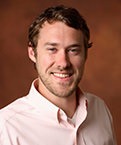 Director of Investor Relations, Global Partnerships, Seattle: Jason Henning How would you describe your job? As Director of Investor Relations at Global Partnerships, I manage the full relationship cycle for all of our investors. This begins during prospect research, continues through outreach and engagement, and leads to sourcing capital commitments for our social investment funds. After investors participate in our funds, I am responsible for overseeing the relationship and communication efforts. More.
Director of Investor Relations, Global Partnerships, Seattle: Jason Henning How would you describe your job? As Director of Investor Relations at Global Partnerships, I manage the full relationship cycle for all of our investors. This begins during prospect research, continues through outreach and engagement, and leads to sourcing capital commitments for our social investment funds. After investors participate in our funds, I am responsible for overseeing the relationship and communication efforts. More.
Highlighted positions
Executive Director, Prosthetics Outreach Foundation, Seattle
Working with the Director of Programs, the Executive Director assumes leadership to ensure that all programs are designed and implemented to deliver services effectively and efficiently to each country site. Regular site visits to monitor program implementation and outcomes is required. A key aspect of the position is fundraising and alliance building. More.
Manager or Director of Programming and Events, The HUB Seattle
We’re looking for a Manager/Director of Programming and Events. This person will be responsible for the planning and execution of all HUB Seattle gatherings and events, including revenue and non-revenue producing events. Types of events might include talks, master classes, barcamps, hackathons, launch weekends, pitch nights, flavor fests from local restaurants, HUB Happy Hours, game nights, founder dating events, venture fund booth nights, film screenings, photography showings, and more. More.
Manager or Director of Marketing and Evangelism, The HUB Seattle
We’re looking for a Manager/Director of Marketing and Evangelism. This person will be responsible for the development, planning, and execution of comprehensive marketing strategies and campaigns (both online and offline) to promote the HUB Seattle brand, drive attendance to HUB Seattle events, raise awareness of the extraordinary accomplishments of our members, and build the HUB Seattle community. More.
Highlighted Internship
Grameen Foundation Internships 2012, Grameen Foundation
Grameen Foundation has a relatively small staff despite all the work we do, making volunteers and interns critical to our employees in carrying out their work. Interns, in particular, enable program and operations’ staff to pursue informative research and analysis and more efficiently fulfill ongoing reporting and administrative requirements. More.
Highlighted Volunteer Opportunity
Global Engagement and Tithe Committee Member, Habitat for Humanity of Seattle/South King County
Global Engagement and Tithe Committee members manage the international relations program for the Seattle/South King County affiliate. Service in the international arena is a key element in the mission of our affiliate to provide decent, safe affordable housing for all. Our work includes outreach and advocacy in the greater Seattle area, tithing of our unrestricted funds to 4 partner countries each year, and periodic Global Village trips to build homes for needy families overseas. More.
Announcements
Hear Dr. Sakeena Yacoobi at GlobalWA’s 4 th Annual Conference
We are honored to announce that Dr. Sakeena Yacoobi—founder and Executive Director of the Afghan Institute of Learning—will be speaking at our annual conference on Dec. 6, 2012. Since 1996, Dr. Yacoobi has provided education and health services to more than 9 million Afghan women and children. Her organization was the first to offer human rights and leadership training to Afghan women and first to open Women’s Learning Centers in the country.
In 2012, Dr. Yacoobi was presented with the German Media Award, the Lotus Leadership Award from the Asia Foundation, and the World’s Children’s Prize Honorary Award. In 2010, she also received the Jonathan Mann Award for Global Health and Human Rights and the Asia Social Entrepreneur of the Year Award from the Schwab Foundation. In 2011, she was awarded the National Peace Award by Afghan President Hamid Karzai and was inducted into the Enterprising Women Hall of Fame.
Dr. Yacoobi is an Ashoka Fellow and Skoll Social Entrepreneur, and has received the Henry R. Kravis Award for Leadership, the Democracy Award from the National Endowment of Democracy, the Women’s Rights Prize of the Peter Gruber Foundation, and the Americans for UNFPA Board of Advocates Award for the Health and Dignity of Women. We hope you’ll join us and hear Dr. Yacoobi speak at our 2012 Conference! Visit our website for early-bird registration.
PeaceTrees Vietnam seeks new Executive Director
PeaceTrees Vietnamis seeking an Executive Director to start in September 2012. The Executive Director provides overall strategic leadership and management direction to support the healthy functioning of the organization and execution of the mission. Responsibilities:
- Make sure the organizations goals, objectives and work plans are created, updated and executed.
- Regularly assess the needs in Central Vietnam and recommending performance-based adjustments to PeaceTrees’ programs/partnerships to maximize efficiency.
- Create and execute a strategy to raise sustained funding.
- Builds and maintains partnerships which include the U.S. Department of State; foundations; other NGOs working in Vietnam; the national, provincial and local governmental organizations in Vietnam; and many other organizations.
- Oversee cash flow; ensure effective audit trails and internal controls; ensure compliance with grant and regulatory requirements; and distribute accurate and timely monthly financial statements to the Board.
- Hire , set goals for, and coach staff members.
- Assume overall responsibility for all administrative activities. Keeps Board members informed and helps get them involved through committee work.
- Serve as the chief spokesperson before donors, staff, volunteers, Board members, Vietnamese officials, agencies and organizations.
Requirements include 5+ years nonprofit management and grant writing experience; Board development experience; a proven track record as a fundraiser; demonstrated cultural competence; a proven record of running a fiscally sound organization; good communication skills and the ability to travel to Vietnam several times a year.
Full job description and instructions on how to apply. While the position will be open until filled, it is expected that qualified candidates will be interviewed July and August.
Event Planner needed at MEDRIX
A short-term contract has opened up at MEDRIX for an Event Planner to handle fundraising events in the last quarter of 2012. The position is available immediately.
The Event Planner will envision benefit events, and is responsible for planning and implementing, from start to finish, our fundraising event for 2012. Qualified person has the ability to ensure this vision is realized by organizing, managing, and maintaining the progress and productive interaction of various parties, including volunteers, market place vendors and partners.
The position requires three years recent event planning experience and a BA in Marketing or Marketing Communications.
MEDRIX is a 501(c)(3) nonprofit organization which provides medical resources, international health education, child heart surgeries and safe water development in Southeast Asia. If you are interested in finding out more, contact mailto:moffice@medrix.org for a position outline.
Global Washington Events
Thursday, July 26
Global Workers Series: Launching your career in Global Health
Thursday, December 6
4th Annual Conference
Other Events
Wednesday, July 25
2012 Mid-year Review and Forecast Update of Asian Economies
Thursday, July 26
Benefit: “Global Health Month ‘Tweet-Up’ for Jolkona” (a Socializing for Social Change event)
Tuesday, July 31
Business Partnerships for Global Health: Successes, Obstacles and Opportunities
Wednesday, August 1
YPIN: French Conversation Group
Tuesday, September 11
Everett Roundtable: Washington State International Competitiveness Strategy
Wednesday, September 19
Proposal Writing 201: Advanced tools for getting your project funded
Editor: Megan Boucher